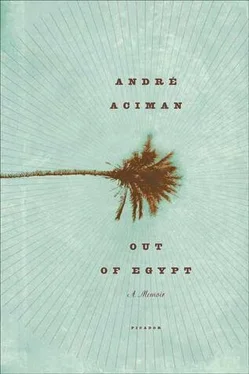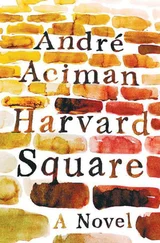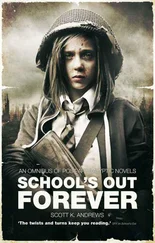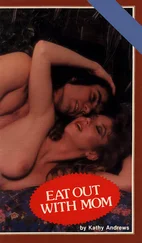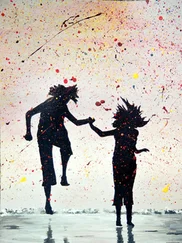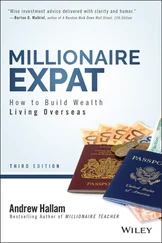“No,” said Elsa, “either we read everything or nothing at all.” An argument was about to erupt. “Where is Nessim now that we need him,” said Elsa with that doleful tone in her voice that explained her success at Lourdes. “As far away from you as he can be,” muttered my father under his breath, which immediately made me giggle. My mother, catching my attempt to stifle a laugh, began to smile; she knew exactly what my father had said though she had not heard it. My father, too, was infected by the giggling, which he smothered as best as he could, until my grandmother caught sight of him, which sent her laughing uncontrollably. No one had any idea what to do, what to read, or when to stop. “Some Jews we are,” said Aunt Elsa, who had also started to laugh and whose eyes were tearing. “Shall we eat, then?” asked my father. “Good idea,” I said. “But we’ve only just begun,” protested Aunt Elsa, recovering her composure. “It’s the very last time. How could you? We’ll never be together again, I can just feel it.” She was on the verge of tears, but my grandmother warned her that she, too, would start crying if we kept on like this. “This is the last year,” said Elsa, reaching out and touching my hand. “It’s just that I can remember so many seders held in this very room, for fifty years, year after year after year. And I’ll tell you something,” she said, turning to my father. “Had I known fifty years ago that it would end like this, had I known I’d be among the last in this room, with everyone buried or gone away, it would have been better to die, better to have died back then than to be left alone like this.” “Calm yourself, Elsica,” said my father, “otherwise we’ll all be in mourning here.”
At that point, Abdou walked in and, approaching my father, said there was someone on the telephone asking for him. “Tell them we are praying,” said my father. “But sir—” He seemed troubled and began to speak softly. “So?” “She said she wanted to apologize.” No one said anything. “Tell her not now.” “Very well.”
We heard the hurried patter of Abdou’s steps up the corridor, heard him pick up the receiver and mumble something. Then, with relief, we heard him hang up and go back into the kitchen. It meant she had not insisted or argued. It meant he would be with us tonight. “Shall we eat, then?” said my mother. “Good idea,” I repeated. “Yes, I’m starving,” said Aunt Elsa. “An angel you married,” murmured my grandmother to my father.
After dinner, everyone moved into the smaller living room, and, as was her habit on special gatherings, Aunt Elsa asked my father to play the record she loved so much. It was a very old recording by the Busch Quartet, and Aunt Elsa always kept it in her room, fearing someone might ruin it. I had noticed it earlier in the day lying next to the radio. It meant she had been planning the music all along. “Here,” she said, gingerly removing the warped record from its blanched dust jacket with her arthritic fingers. It was Beethoven’s “Song of Thanksgiving.” Everyone sat down, and the adagio started.
The old 78 hissed, the static louder than the music, though no one seemed to notice, for my grandmother began humming, softly, with a plangent, faraway whine in her voice, and my father shut his eyes, and Aunt Elsa began shaking her head in rapt wonder, as she did sometimes when tasting Swiss chocolate purchased on the black market, as if to say, “How could anyone have created such beauty?”
And there, I thought, was my entire world: the two old ones writhing in a silent stupor, my father probably wishing he was elsewhere, and my mother, whose thoughts, as she leafed through a French fashion magazine, were everywhere and nowhere, but mostly on her husband, who knew that she would say nothing that evening and would probably let the matter pass quietly and never speak of it again.
I motioned to my mother that I was going out for a walk. She nodded. Without saying anything, my father put his hand in his pocket and slipped me a few bills.
Outside, Rue Delta was brimming with people. It was the first night of Ramadan and the guns marking the end of the fast had gone off three hours earlier. There was unusual bustle and clamor, with people gathered in groups, standing in the way of traffic, making things noisier and livelier still, the scent of holiday pastries and fried treats filling the air. I looked up at our building: on our floor, all the lights were out except for Abdou’s and those in the living room. Such weak lights, and so scant in comparison to the gaudy, colored bulbs that hung from all the lampposts and trees — as if the electricity in our home were being sapped and might die out at any moment. It was an Old World, old-people’s light.
As I neared the seafront, the night air grew cooler, saltier, freed from the din of lights and the milling crowd. Traffic became sparse, and whenever cars stopped for the traffic signal, everything grew still: then, only the waves could be heard, thudding in the dark, spraying the air along the darkened Corniche with a thin mist that hung upon the night, dousing the streetlights and the signposts and the distant floodlights by the guns of Petrou, spreading a light clammy film upon the pebbled stone wall overlooking the city’s coastline. Quietly, an empty bus splashed along the road, trailing murky stains of light on the gleaming pavement. From somewhere, in scattered snatches, came the faint lilt of music, perhaps from one of those dance halls where students used to flock at night. Or maybe just a muted radio somewhere on the beach nearby, where abandoned nets gave off a pungent smell of seaweed and fish.
At the corner of the street, from a sidewalk stall, came the smell of fresh dough and of angel-hair being fried on top of a large copper stand — a common sight throughout the city every Ramadan. People would fold the pancakes and stuff them with almonds, syrup, and raisins. The vendor caught me eyeing the cakes that were neatly spread on a black tray. He smiled and said, “ Etfaddal, help yourself.”
I thought of Aunt Elsa’s chiding eyes. “But it’s Pesah,” I imagined her saying. My grandmother would disapprove too — eating food fried by Arabs on the street, unconscionable. The Egyptian didn’t want any money. “It’s for you,” he said, handing me the delicacy on a torn sheet of newspaper.
I wished him a good evening and took the soggy pancake out onto the seafront. There, heaving myself up on the stone wall, I sat with my back to the city, facing the sea, holding the delicacy I was about to devour. Abdou would have called this a real mazag , accompanying the word, as all Egyptians do, with a gesture of the hand — a flattened palm brought to the side of the head — signifying blissful plenitude and the prolonged, cultivated consumption of everyday pleasures.
Facing the night, I looked out at the stars and thought to myself, over there is Spain, then France, to the right Italy, and, straight ahead, the land of Solon and Pericles. The world is timeless and boundless, and I thought of all the shipwrecked, homeless mariners who had strayed to this very land and for years had tinkered away at their damaged boats, praying for a wind, only to grow soft and reluctant when their time came.
I stared at the flicker of little fishing boats far out in the offing, always there at night, and watched a group of children scampering about on the beach below, waving little Ramadan lanterns, the girls wearing loud pink-and-fuchsia dresses, locking hands as they wove themselves into the dark again, followed by another group of child revelers who were flocking along the jetty past the sand dunes, some even waving up to me from below. I waved back with a familiar gesture of street fellowship and wiped the light spray that had moistened my face.
Читать дальше
